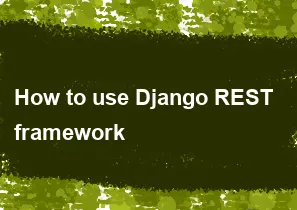How to use Django REST framework

Django REST Framework (DRF) is a powerful and flexible toolkit for building Web APIs in Django applications. It provides a set of tools and conventions to simplify the creation of RESTful APIs. Here's a basic guide to getting started with Django REST Framework:
1. Install Django REST Framework
Make sure you have Django installed. You can install Django REST Framework using pip:
bashpip install djangorestframework
2. Add DRF to your Django project
Add 'rest_framework' to the INSTALLED_APPS list in your Django project's settings:
python# settings.py
INSTALLED_APPS = [
# ...
'rest_framework',
# ...
]
3. Create a Serializer
Serializers are used to convert complex data types, such as Django models, into Python data types that can be easily rendered into JSON.
python# serializers.py
from rest_framework import serializers
from .models import YourModel
class YourModelSerializer(serializers.ModelSerializer):
class Meta:
model = YourModel
fields = '__all__'
4. Create a ViewSet
ViewSets define the view behavior. They encapsulate the logic for handling HTTP methods (GET, POST, etc.) for different endpoints.
python# views.py
from rest_framework import viewsets
from .models import YourModel
from .serializers import YourModelSerializer
class YourModelViewSet(viewsets.ModelViewSet):
queryset = YourModel.objects.all()
serializer_class = YourModelSerializer
5. Wire up the URLs
Connect the ViewSet to URLs in your urls.py:
python# urls.py
from rest_framework.routers import DefaultRouter
from .views import YourModelViewSet
router = DefaultRouter()
router.register(r'your-model', YourModelViewSet, basename='your-model')
urlpatterns = router.urls
6. Run migrations
Make sure to run migrations to create the necessary database tables for your models:
bashpython manage.py makemigrations python manage.py migrate
7. Run the development server
bashpython manage.py runserver
Now, you can access your API endpoints. DRF will provide a browsable API that makes it easy to explore and interact with your API using a web browser.
This is a basic setup, and there's a lot more you can do with Django REST Framework, including authentication, permissions, pagination, and more. Refer to the official documentation for more advanced features: Django REST Framework Documentation.
-
Popular Post
- How to optimize for Google's About This Result feature for local businesses
- How to implement multi-language support in an Express.js application
- How to handle and optimize for changes in mobile search behavior
- How to handle CORS in a Node.js application
- How to use Vue.js with a UI framework (e.g., Vuetify, Element UI)
- How to configure Laravel Telescope for monitoring and profiling API requests
- How to create a command-line tool using the Commander.js library in Node.js
- How to implement code splitting in a React.js application
- How to use the AWS SDK for Node.js to interact with various AWS services
- How to use the Node.js Stream API for efficient data processing
- How to implement a cookie parser middleware in Node.js
- How to implement WebSockets for real-time communication in React
-
Latest Post
- How to implement a dynamic form with dynamic field styling based on user input in Next.js
- How to create a custom hook for handling user interactions with the browser's device motion in Next.js
- How to create a custom hook for handling user interactions with the browser's battery status in Next.js
- How to implement a dynamic form with dynamic field visibility based on user input in Next.js
- How to implement a dynamic form with real-time collaboration features in Next.js
- How to create a custom hook for handling user interactions with the browser's media devices in Next.js
- How to use the useSWRInfinite hook for paginating data with a custom loading indicator in Next.js
- How to create a custom hook for handling user interactions with the browser's network status in Next.js
- How to create a custom hook for handling user interactions with the browser's location in Next.js
- How to implement a dynamic form with multi-language support in Next.js
- How to create a custom hook for handling user interactions with the browser's ambient light sensor in Next.js
- How to use the useHover hook for creating interactive image zoom effects in Next.js